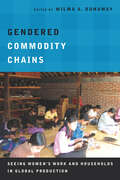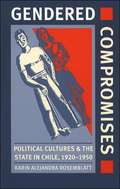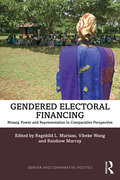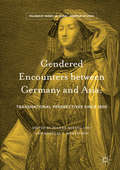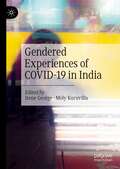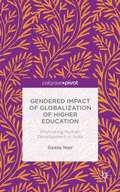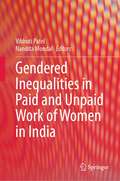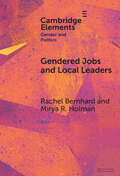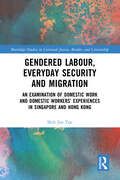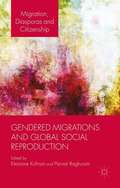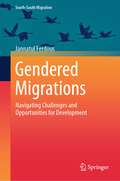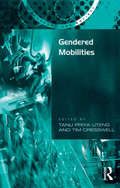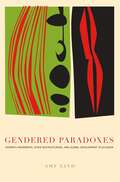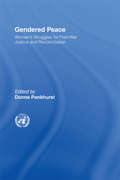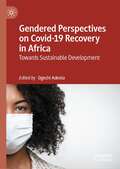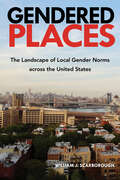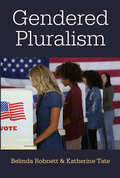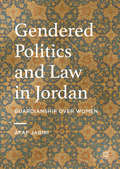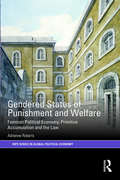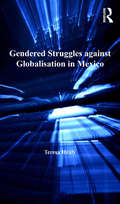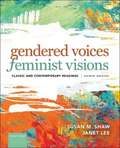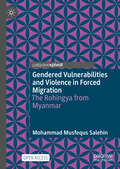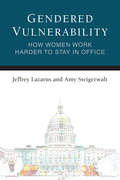- Table View
- List View
Gendered Commodity Chains: Seeing Women's Work and Households in Global Production
by Wilma A. DunawayGendered Commodity Chains is the first book to consider the fundamental role of gender in global commodity chains. It challenges long-held assumptions of global economic systems by identifying the crucial role social reproduction plays in production and by declaring the household as an important site of production. In affirming the importance of women's work in global production, this cutting-edge volume fills an important gender gap in the field of global commodity and value chain analysis. With thirteen chapters by an international group of scholars from sociology, anthropology, economics, women's studies, and geography, this volume begins with an eye-opening feminist critique of existing commodity chain literature. Throughout its remaining five parts, Gendered Commodity Chains addresses ways women's work can be integrated into commodity chain research, the forms women's labor takes, threats to social reproduction, the impact of indigenous and peasant households on commodity chains, the rapidly expanding arenas of global carework and sex trafficking, and finally, opportunities for worker resistance. This broadly interdisciplinary volume provides conceptual and methodological guides for academics, graduate students, researchers, and activists interested in the gendered nature of commodity chains.
Gendered Compromises
by Karin Alejandra RosemblattWith this book, Karin Rosemblatt presents a gendered history of the politics and political compromise that emerged in Chile during the 1930s and 1940s, when reformist popular-front coalitions held power. While other scholars have focused on the economic realignments and novel political pacts that characterized Chilean politics during this era, Rosemblatt explores how gender helped shape Chile's evolving national identity. Rosemblatt examines how and why the aims of feminists, socialists, labor activists, social workers, physicians, and political leaders converged around a shared gender ideology. Tracing the complex negotiations surrounding the implementation of new labor, health, and welfare policies, she shows that professionals in health and welfare agencies sought to regulate gender and sexuality within the working class and to consolidate the male-led nuclear family as the basis of societal stability. Leftists collaborated in these efforts because they felt that strong family bonds would generate a sense of class belonging and help unify the Left, while feminists perceived male familial responsibility as beneficial for women. Diverse actors within civil society thus reworked the norms of masculinity and femininity developed by state agencies and political leaders--even as others challenged those ideals.
Gendered Electoral Financing: Money, Power and Representation in Comparative Perspective (Gender and Comparative Politics)
by Ragnhild L. Muriaas Vibeke Wang Rainbow MurrayIllustrated by in-depth empirical research from six country studies, Gendered Electoral Financing: Money, Power and Representation in Comparative Perspective is the first cross-regional examination of the nexus between money, gender and political recruitment across the world. Money is assumingly one of the greatest barriers to women in the political recruitment process. The financial disadvantage of women is expected to constitute an obstacle for women’s entry into politics everywhere and especially in developing countries where women’s socio-economic status is disproportionately low relative to men’s. This line of reasoning has caused a global upswing in both candidate- and party-directed financial schemes introduced to enhance gender balance in political office. This book develops a typology of different kinds of gendered electoral financing schemes and builds theories about its causes and consequences. By comparing how gendered electoral financing affects political recruitment processes in both established and emerging democracies, the authors identify whether and how the funding mechanisms incentivize a shift in political behavior. Gendered Electoral Financing is a timely, informative and well-written book that does an excellent job of explaining, in language accessible to students and researchers alike, the cost of elections, gender imbalance in political office and the effects of financial incentive mechanisms to increase women’s representation in politics.
Gendered Encounters between Germany and Asia
by Joanne Miyang Cho Douglas T. McgetchinThis volume provides new insights into gendered interactions over the past two centuries between Germany and Asia, including India, China, Japan, and previously overlooked Asian countries including Vietnam, the Philippines, Thailand, and Korea. This volume presents scholarship from academics working in the field of German-Asian Studies as it relates to gender across transnational encounters in the nineteenth and twentieth centuries. Gender has been a lens of analysis in isolated published chapters in previous edited volumes on German-Asian connections, but nowhere has there been a volume specifically dedicated to the analysis of gender in this field. Rejecting traditional notions of West and East as seeming polar opposites, their contributions to this volume attempts to reconstruct the ways in which German and Asian men and women have cooperated and negotiated the challenge of modernity in various fields.
Gendered Experiences of COVID-19 in India
by Irene George Moly KuruvillaThis edited volume critically reflects on the ways in which the COVID-19 pandemic has affected and continues to affect women in India. Drawing on a range of qualitative and quantitative research, contributors analyze the implications of the pandemic on the informal sector, migrant women workers, women in the health care sector, women’s economic engagement, the experiences of elderly women, mental health care, higher education, and more. Chapters also consider what gender-responsive policies are needed to ensure women’s equal rights, representation, and participation in society during and after the COVID-19 pandemic. This timely and relevant volume situates India within the larger global context of conversations around economic, social and political consequences of the pandemic upon gender inequalities This book will be of interest to scholars, students, and policy makers in the fields of Sociology, Gender Studies, and Public and Social Policy.
Gendered Impact of Globalization of Higher Education: Promoting Human Development In India
by Geeta NairThis book explores the significant role education plays in the promotion of human development and gender equality in India, situating this progression in relation to developed nations, the other BRIC countries and the ongoing attainment of the Millennium Development Goals.
Gendered Inequalities in Paid and Unpaid Work of Women in India
by Vibhuti Patel Nandita MondalThis book explores Indian women's economic contribution through paid and unpaid work in different sectors of the economy and society in extremely diverse life situations and geographical locations. It highlights gender implications of interlinkages between local, national, regional and global dimensions of women's paid and unpaid work in India. It encompasses a vast canvas of life worlds of working women in the metropolitan, urban, peri-urban, rural, tribal areas in manufacturing, agricultural, fisheries, sericulture, plantation and service sectors of the Indian economy. It provides nuanced insights into intersectional marginalities of caste, class, ethnicity, religion and gender. The chapters are based on primary data collection and triangulation of qualitative and quantitative research methodologies. It presents the multiple marginalities of Indian women in the globalized political economy of the 21st century. It not only focuses on emerging issues but also suggests evidence-based policy imperatives. This book is an essential read for researchers, scholars, policymakers, practitioners and students of women/gender studies.
Gendered Jobs and Local Leaders: Women, Work, and the Pipeline to Local Political Office (Elements in Gender and Politics)
by Rachel Bernhard Mirya R. HolmanMen from business are overrepresented in local politics in the United States. The authors propose a theory of gendered occupations and ambition: the jobs people hold-and the gender composition of those jobs-shape political ambition and candidate success. They test their theory using data on gender and jobs, candidacy and electoral outcomes from thousands of elections in California, and experimental data on voter attitudes. They find that occupational gendered segregation is a powerful source of women's underrepresentation in politics. Women from feminine careers run for office far less than men. Offices also shape ambition, candidates with feminine occupations run for school board, not mayor or sheriff. In turn, people see the offices that women run for as feminine and less prestigious. This Element provides a rich picture of the pipeline to office and the ways it favours men. This title is also available as Open Access on Cambridge Core.
Gendered Labour, Everyday Security and Migration: An Examination of Domestic Work and Domestic Workers’ Experiences in Singapore and Hong Kong (Routledge Studies in Criminal Justice, Borders and Citizenship)
by Shih Joo TanDrawing on original empirical research from Singapore and Hong Kong, Gendered Labour, Everyday Security and Migration interrogates women migrant domestic workers’ experiences of work and workplace exploitation. It examines the ways in which these women negotiate everyday security and safe work against the backdrop of affective employment relations and institutional structures of labour and migration law. It challenges the current emphasis on the language of exploitation and legal approaches to identifying, understanding and rectifying poor employment conditions for women migrant domestic workers. This book addresses the limited research literature that examines the extent to which regulatory or criminal justice responses are relevant to, and utilised by, women migrant domestic workers in their everyday negotiation of safe work and offers a unique contribution to the field. An accessible and compelling read, it will be of interest to researchers from across the fields of criminology, sociology, labour migration studies and women’s studies.
Gendered Migrations and Global Social Reproduction
by Eleonore Kofman Parvati RaghuramEleonore Kofman and Parvati Raghuram argue for the benefits of social reproduction as a lens through which to understand gendered transformations in global migration. They highlight the range of sites, sectors, and skills in which migrants are employed and how migration is both a cause and an outcome of depletion in social reproduction.
Gendered Migrations: Navigating Challenges and Opportunities for Development (International Perspectives on Migration)
by Jannatul FerdousThis book delves into the multifaceted interplay between gender, migration, and development. It challenges conventional theories by sharing the unique experiences of migrants, particularly women, and their profound impact on development in the global South. It contributes significantly to the theory of intersectionality, which illuminates how various forms of oppression and privilege intertwine to shape individuals' experiences. It ventures beyond traditional boundaries, recognizing migration and development as transnational processes that transcend singular actors and spaces. It highlights the interconnectedness of people, cultures, and economies across national borders, unraveling the complex tapestry of migration and development. It provides invaluable feminist perspectives, illuminating pathways toward inclusivity and equity in development. Through its nuanced analysis, this book paves the way for a more inclusive, equitable, and empowering future for individuals and communities. It is a valuable resource for policymakers, practitioners, and scholars seeking to promote social justice and gender equality in migration and development contexts.
Gendered Mobilities (Transport And Mobility Ser.)
by Tim CresswellBeing socially and geographically mobile is generally seen as one of the central aspects of women's wellbeing. Alongside health, education and political participation, mobility is indispensable in order for women to reach goals such as agency and freedom. Building on new philosophical underpinnings of 'mobility', whereby society is seen to be framed by the convergence of various mobilities, this volume focuses on the intersection of mobility, social justice and gender. The authors reflect on five highly interdependent mobilities that form and reform social life: *
Gendered Paradoxes: Women's Movements, State Restructuring, and Global Development in Ecuador
by Amy LindSince the early 1980s Ecuador has experienced a series of events unparalleled in its history. Its “free market” strategies exacerbated the debt crisis, and in response new forms of social movement organizing arose among the country’s poor, including women’s groups. Gendered Paradoxes focuses on women’s participation in the political and economic restructuring process of the past twenty-five years, showing how in their daily struggle for survival Ecuadorian women have both reinforced and embraced the neoliberal model yet also challenged its exclusionary nature. Drawing on her extensive ethnographic fieldwork and employing an approach combining political economy and cultural politics, Amy Lind charts the growth of several strands of women’s activism and identifies how they have helped redefine, often in contradictory ways, the real and imagined boundaries of neoliberal development discourse and practice. In her analysis of this ambivalent and “unfinished” cultural project of modernity in the Andes, she examines state policies and their effects on women of various social sectors; women’s community development initiatives and responses to the debt crisis; and the roles played by feminist “issue networks” in reshaping national and international policy agendas in Ecuador and in developing a transnationally influenced, locally based feminist movement.
Gendered Paradoxes: Women's Movements, State Restructuring, and Global Development in Ecuador (G - Reference, Information and Interdisciplinary Subjects)
by Amy LindSince the early 1980s Ecuador has experienced a series of events unparalleled in its history. Its “free market” strategies exacerbated the debt crisis, and in response new forms of social movement organizing arose among the country’s poor, including women’s groups. Gendered Paradoxes focuses on women’s participation in the political and economic restructuring process of the past twenty-five years, showing how in their daily struggle for survival Ecuadorian women have both reinforced and embraced the neoliberal model yet also challenged its exclusionary nature. Drawing on her extensive ethnographic fieldwork and employing an approach combining political economy and cultural politics, Amy Lind charts the growth of several strands of women’s activism and identifies how they have helped redefine, often in contradictory ways, the real and imagined boundaries of neoliberal development discourse and practice. In her analysis of this ambivalent and “unfinished” cultural project of modernity in the Andes, she examines state policies and their effects on women of various social sectors; women’s community development initiatives and responses to the debt crisis; and the roles played by feminist “issue networks” in reshaping national and international policy agendas in Ecuador and in developing a transnationally influenced, locally based feminist movement.
Gendered Peace: Women's Struggles for Post-War Justice and Reconciliation (Routledge/UNRISD Research in Gender and Development)
by Donna PankhurstThis volume contributes to the growing literature on women, conflict and peacebuilding by focusing on the moments after a peace accord, or some other official ending of a conflict, often denoted as ‘post-conflict’ or ‘post-war’. Such moments often herald great hope for holding to account those who committed grave wrongs during the conflict, and for a better life in the future. For many women, both of these hopes are often very quickly shattered in starkly different ways to the hopes of men. Such periods are often characterized by violence and insecurities, and the official ending of a war often fails to bring freedom from sexual violence for many women. Within such a context, efforts on the part of women, and those made on their behalf, to hold to account those who commit crimes against them, and to access their rights are difficult to make, are often dangerous, and are also often deployed with little effect. Gendered Peace explores international contexts, and a variety of local ones, in which such struggles take place, and evaluates their progress. The volume highlights the surprising success in the development of international legal advances for women, but contrasts this with the actual experience of women in cases from Sierra Leone, Rwanda, South Africa, Afghanistan, Bangladesh, East Timor, Peru, Central America and the Balkans.'
Gendered Perspectives on Covid-19 Recovery in Africa: Towards Sustainable Development
by Ogechi AdeolaThis book describes the political, social, and economic connections between gender and the Covid-19 pandemic. The authors offer innovative ideas for recovery that will build a more prosperous, healthy, equitable, and sustainable future for African women and girls, targets identified under Goal 5 (Gender Equality and Women’s Empowerment) of the United Nations’ Sustainable Development Goals slated to be achieved by 2030. Within this context, authors identify issues related to the protection of women and girls from poverty, hunger, and gender-based violence; improved healthcare and healthcare workforce experiences; girl-child education; financial inclusion; and entrepreneurship opportunities for women in fintech, tourism, and information, communication and technology (ICT). The book concludes with a discussion of economic empowerment for women that focuses on normalising the ‘un-normal’ outcome of the pandemic. The book will be of value to policymakers, non-profit organisations, practitioners, and scholars who understand the importance of gender equality and women empowerment in the African continent.
Gendered Places: The Landscape of Local Gender Norms across the United States
by William J. ScarboroughEvery place has its quirky attributes, cultural reputation, and distinctive flair. But when we travel across America, do we also experience distinct gender norms and expectations? In his groundbreaking Gendered Places, William Scarborough examines metropolitan commuting zones to see how each region’s local culture reflects gender roles and gender equity. He uses surveys and social media data to measure multiple dimensions of gender norms, including expectations toward women in leadership, attitudes toward working mothers, as well as the division of household labor. Gendered Places reveals that different locations, even within the same region of the country, such as Milwaukee and Madison Wisconsin, have distinct gender norms and highly influential cultural environments. Scarboroughshows how these local norms shape the attitudes and behaviors of residents with implications on patterns of inequality such as the gender wage gap. His findings offer valuable insight for community leaders and organizers making efforts to promote equality in their region. Scarboroughrecognizes local culture as not value-neutral, but highly crucial to the gender structure that perpetuates, or challenges, gender inequality. Gendered Places questions how these gender norms are sustained and their social consequences.
Gendered Places: The Landscape of Local Gender Norms across the United States
by William J. ScarboroughEvery place has its quirky attributes, cultural reputation, and distinctive flair. But when we travel across America, do we also experience distinct gender norms and expectations? In his groundbreaking Gendered Places, William Scarborough examines metropolitan commuting zones to see how each region’s local culture reflects gender roles and gender equity. He uses surveys and social media data to measure multiple dimensions of gender norms, including expectations toward women in leadership, attitudes toward working mothers, as well as the division of household labor. Gendered Places reveals that different locations, even within the same region of the country, such as Milwaukee and Madison Wisconsin, have distinct gender norms and highly influential cultural environments. Scarboroughshows how these local norms shape the attitudes and behaviors of residents with implications on patterns of inequality such as the gender wage gap. His findings offer valuable insight for community leaders and organizers making efforts to promote equality in their region. Scarboroughrecognizes local culture as not value-neutral, but highly crucial to the gender structure that perpetuates, or challenges, gender inequality. Gendered Places questions how these gender norms are sustained and their social consequences.
Gendered Pluralism (The Cawp Series In Gender And American Politics)
by Katherine Tate Belinda RobnettFocused on structural and political intersectionalities, Gendered Pluralism takes a broader approach to understanding the constellation of factors that drive gender and racial differences on an array of public policy issues. Belinda Robnett and Katherine Tate examine a broader set of actors absent the contextual factors that may drive them to compromise their opinions. Their study examines the ways in which (1) men and women differ on public policy issues and the factors that drive these differences; (2) whites and racial-ethnic minorities differ on public policy issues and the factors that drive these differences; (3) women differ on public policy issues and the factors that drive these differences; (4) African-American men and women differ on public policy issues and the factors that drive these differences; and (5) African-American women differ on public policy issues and the factors that drive these differences.
Gendered Politics and Law in Jordan
by Afaf JabiriThis book analyzes how the state constructs and reproduces gender identities in the context and geopolitics of Jordan. It addresses the relevance of the state and its web of relations in understanding the politics of gender in the Middle East, rather than a cultural or religious explanation for women's subjugation. Guardianship over women is examined as not only the basis of women's legal and social subordination, but also a key factor in the construction and reproduction of a gender hierarchy system. The author probes how a masculine state gives power and legitimacy through guardianship to institutions-including family, religion, and tribe-in managing, producing, and constructing gender identity. Does the masculine institution succeed in imposing a dominant form of femininity? Or are there ways by which women escape and resist the social and legal construction of femininity? Based on over 60 case studies of contemporary women in Jordan, the book additionally examines how the resultant strategies and tactics developed by women in Jordan are influenced by and affect their status within the guardianship system.
Gendered States of Punishment and Welfare: Feminist Political Economy, Primitive Accumulation and the Law (RIPE Series in Global Political Economy)
by Adrienne RobertsThis book presents a feminist historical materialist analysis of the ways in which the law, policing and penal regimes have overlapped with social policies to coercively discipline the poor and marginalized sectors of the population throughout the history of capitalism. Roberts argues that capitalism has always been underpinned by the use of state power to discursively construct and materially manage those sectors of the population who are most resistant to and marginalized by the instantiation and deepening of capitalism. The book reveals that the law, along with social welfare regimes, have operated in ways that are highly gendered, as gender – along with race – has been a key axis along which difference has been constructed and regulated. It offers an important theoretical and empirical contribution that disrupts the tendency for mainstream and critical work within IPE to view capitalism primarily as an economic relation. Roberts also provides a feminist critique of the failure of mainstream and critical scholars to analyse the gendered nature of capitalist social relations of production and social reproduction. Exploring a range of issues related to the nature of the capitalist state, the creation and protection of private property, the governance of poverty, the structural compulsions underpinning waged work and the place of women in paid and unpaid labour, this book is of great use to students and scholars of IPE, gender studies, social work, law, sociology, criminology, global development studies, political science and history.
Gendered Struggles against Globalisation in Mexico (Gender in a Global/Local World)
by Teresa HealyTeresa Healy here examines resistance within Mexican society during a period of sustained crisis at the regional and national level, as well as at the level of world order. She analyzes how working class men organized to fight for the recognition of their citizenship rights, how they defended those rights when faced with repression and economic restructuring and how they contested the terms of globalization as it wrested from them their masculine identity of 'worker-fathers'. Healy also demonstrates how these men battled employers and masculinized political power at every level within the state to maintain their livelihoods and resist the feminization of their work and their own identities. These were gendered struggles against globalizations as they were experienced and carried out by men. The volume uncovers the limits and possibilities of working class men and women in transforming the conditions in which they live and work, and highlights the diversity and rich political history of social movements in Mexico.
Gendered Voices, Feminist Visions
by Janet Lee Susan M. ShawGendered Voices, Feminist Visions: Classic and Contemporary Readings, Eighth Edition, is a balanced collection of classic, conceptual, and experiential selections. Accessible and student-friendly, the readings reflect the great diversity of women's experiences. Framework essays provide context and connections for students, while features like learning activities, ideas for activism, and questions for discussion provide a strong pedagogical structure for the readings.
Gendered Vulnerabilities and Violence in Forced Migration: The Rohingya from Myanmar
by Mohammad Musfequs SalehinThis open access book investigates the gendered violence and vulnerabilities experienced by Rohingya men and women, drawing on qualitative data from refugee camps in Bangladesh. It shows that in Myanmar, men suffered torture and sexual violence, while women experienced physical, mental and sexual violence, legitimized by patriarchal norms. Sexual violence was wielded as a weapon to coerce their exodus from Myanmar and to disrupt the essential facets of Rohingya femininity, motherhood, and reproductive capabilities. Structural, cultural and symbolic violence affected the Rohingya differently across gender lines. A gendered threat narrative and othering cast women as ‘ugly’ and reproductive threats while men are framed as potential threats to national security and Buddhist nationalism. In Bangladesh, gendered othering continued, with Rohingya men seen as security threats and women as vulnerable victims. This book contributes to peace and conflict studies, gender studies, and migration and refugee studies, by analysing gendered violence.
Gendered Vulnerability: How Women Work Harder to Stay in Office (Legislative Politics And Policy Making)
by Amy Steigerwalt Jeffrey LazarusGendered Vulnerability examines the factors that make women politicians more electorally vulnerable than their male counterparts. For instance, female candidates get less and lower quality coverage from the media; they face more and better quality political opponents; and they receive less support from their political parties. Beyond these purely electoral factors, women face persistent gender biases throughout society, which makes it more difficult for them to succeed and can also lead them to doubt their abilities and qualifications. These factors combine to convince women that they must work harder to win elections—a phenomenon that Jeffrey Lazarus and Amy Steigerwalt term “gendered vulnerability.” Since women feel constant pressure to make sure they can win reelection, they devote more of their time and energy to winning their constituents’ favor. For example, women secure more federal spending for their districts and states than men do; women devote more time and energy to constituent services; women introduce more bills and resolutions; and women’s policy positions are more responsive to what their voters want. Lazarus and Steigerwalt examine a dozen different facets of legislative behavior, and find that across them all, female embers simply do a better job of representing their constituents than male members.
